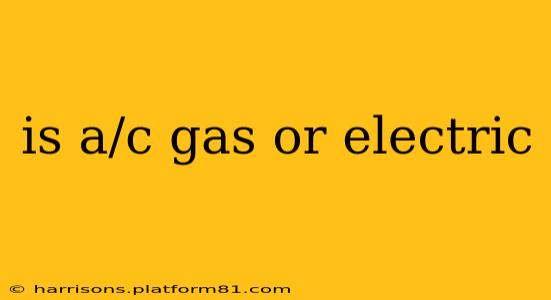Is Air Conditioning Gas or Electric? Understanding HVAC Systems
The short answer is: air conditioning systems use both gas and electricity, but not in the way you might initially think. The confusion stems from the different roles these energy sources play in the cooling process. Let's break down the components and dispel the common misconception.
What is the refrigerant in an AC unit?
The "gas" commonly associated with air conditioners is actually a refrigerant, a special type of fluid. Refrigerants are not simply gases like propane or natural gas; they're carefully engineered compounds designed to absorb and release heat efficiently. Common refrigerants used in modern AC units include R-410A and R-32. These refrigerants are crucial for the cooling cycle, but they don't directly power the system.
How does the AC unit use electricity?
Electricity is the power source for the entire air conditioning system. The electric motor drives the compressor, which is the heart of the AC unit. The compressor is responsible for compressing the refrigerant, raising its pressure and temperature. This high-pressure, high-temperature refrigerant then releases heat to the outside air via the condenser coils.
After releasing heat, the refrigerant then expands and cools significantly, absorbing heat from the indoor air via the evaporator coils. This cooled air is then circulated through your home or building, providing the cooling effect. The entire process relies on electricity to power the compressor and the fan that moves the air.
Does an AC unit use natural gas?
While most residential and commercial air conditioners use electricity, some heating systems can incorporate natural gas or propane. However, these are typically separate units, often furnaces or heat pumps, not the air conditioning components themselves. A heat pump can act as both a heater and a cooler, using electricity but drawing heat from outside air (for heating) or inside air (for cooling). However, natural gas or propane isn't used directly in the cooling function of a heat pump.
What are the different types of air conditioners?
Several types of air conditioners exist, each with its energy source:
-
Central Air Conditioning: This uses electricity to power a system that cools an entire house or building. The refrigerant circulates through ductwork.
-
Window Air Conditioners: These smaller units are also electrically powered and are designed to cool a single room.
-
Portable Air Conditioners: These units, like window units, are electrically powered, but they require a vent for exhaust.
Is AC gas harmful?
Refrigerants, while not inherently dangerous in small amounts, can pose environmental and health risks if improperly handled or leaked. Many modern refrigerants have a lower global warming potential (GWP) compared to older options, but proper installation, maintenance, and responsible disposal are critical. Leaking refrigerant should be handled by trained professionals.
How energy-efficient are different types of AC systems?
The energy efficiency of an AC system is rated using metrics like SEER (Seasonal Energy Efficiency Ratio). Higher SEER ratings indicate greater energy efficiency. Factors like system size, insulation, and proper maintenance significantly impact overall efficiency, regardless of the type of system.
In conclusion, air conditioning systems are primarily powered by electricity, using a refrigerant (often mistakenly referred to as "gas") as the cooling medium. Understanding this distinction clarifies the role of electricity and refrigerant in the cooling process. Remember that proper maintenance is key to efficiency and safety.
